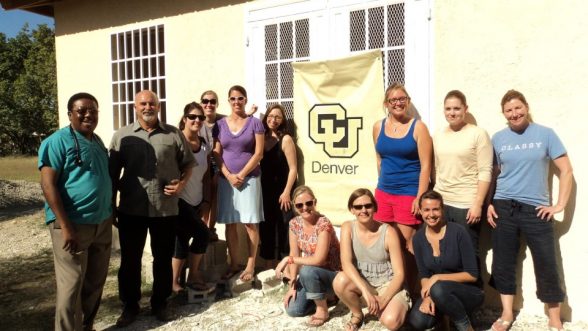
LEOGANE, Haiti – Dr. Blair Gifford, Professor of Management and Health Administration at the University of Colorado Denver Business School, has been hard at work to improve economic and health conditions in Haiti. His project, the development of a vocational training school and midwifery training in Leogane, is making great strides in building economic and health stability in Haiti.
Leogane is a city/region of approximately 250,000 people, which is located about 35 miles southwest of the capital city of Port-au-Prince. The town was the epicenter for the 2010 earthquake that killed an estimated 220,000 people in Haiti. Dr. Gifford began his work in Haiti in 2007, and was awarded a grant by the U.S. State Department in 2009 to investigate innovative education options. After receiving another grant from the State Department in 2010, Dr. Gifford won additional grants for his fieldwork from the Rotary International Foundation in 2011 and 2012 to develop vocational training in Leogane.
The Ecole Professionnel CAMEJO (EPC) vocational training school is being created to help increase access to health services throughout Haiti. The first program conducted at the EPC will be midwifery training, in order to help battle high mortality rates faced in Haiti.
Maternal mortality rates in Haiti are tragically high. Most children are birthed at home, and the majority of Haitian homes are very small thatched huts with dirt floors. Only 25% of births in Haiti are attended by any health professional. As a result, Haiti has the worst maternal mortality rate in the western hemisphere.
According to Dr. Gifford, working among the poor of Haiti is difficult, but exceptionally rewarding. Business School students and faculty are combining their learning of health care and sustainable management to help Haiti move forward.
In addition, students from the MBA/Health Administration program have written a business plan for the EPC vocational training school, which business plan will be presented in the Business School Alliance for Health Management (BAHM) competition. The EPC business plan will also be entered into the CU Denver Bard Center for Entrepreneurship Business Plan competition.
Beyond its role in building economic and health stability in Leogane, the EPC school will serve as a temporary residence for CU Denver students and faculty during their research efforts in Haiti. There is currently one CU Denver medical student from at the school working on AIDS related research, and 3 others have plans to do research at the school in coming months.
Dr. Gifford took a group of students to Haiti in January, 2010 for a study abroad course. When the group left the country on January 12th, their flight turned out to be the last flight out of Haiti before the country was rocked by a 7.0 magnitude earthquake that killed an estimated 220,000 people.
It was not until early January, 2013 that Dr. Gifford took students to Haiti as part of a study abroad course. The course included ten students, and focused on the various health problems in Haiti, and examined potential solutions to these issues. Students learned, for example, about the work of the nonprofit organization Partners in Health developing community-based care to provide HIV/AIDS infected Haitians with antiretroviral therapy. Travel abroad courses at CU Denver, like the one led by Dr. Gifford, are popular with the student, particularly because students are given the opportunity to learn how to operationalize classroom concepts in real situations.
Dr. Gifford’s social business work in Haiti has been so impactful that these projects are starting to be scaled up to new locations. Recently, the Center for Global Health at CU Denver—which Dr. Gifford started in 2002—received a $1 million donation to start a CU medical and education campus in rural Guatemala. Although the primary focus of this project is medical care and public health, there is an important economic development component too. Dr. Gifford is leading a team of MBA students in economic development efforts with a principal goal of providing vocational training for health workers.
For more information about these projects and how to get involved, contact Dr. Blair Gifford: blair.gifford@ucdenver.edu or 303.315.8400


